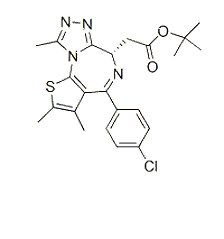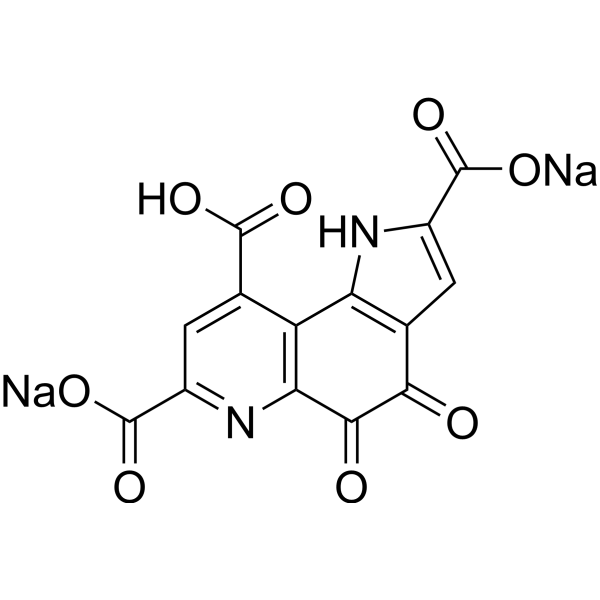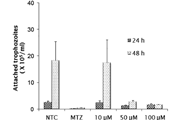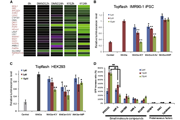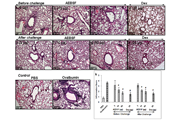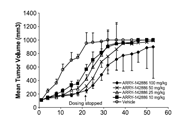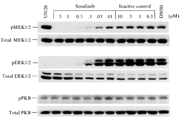-
生物活性
(+)-JQ1 is a potent, high affinity, selective BET bromodomain inhibitor (IC50 values are 17.7, 32.6, 76.9 and 12942 nM for BRD2 (N-terminal (N)), BRD4 (C-terminal (C)), BRD4 (N) and CREBBP respectively; Kd values are 49, 59.5, 82, 90.1, 128 and 190 nM for BRD4 (N), BRD3 (N), BRD3 (C), BRD4 (C), BRD2 (N) and BRDT (N) respectively). Induces squamous differentiation in NUT midline carcinoma (NMC) cell lines; inhibits tumor growth in NMC xenograft models in vivo.
Bindinginhibition of (+)-JQ1 for a tetraacetylated histone H4 peptide to BRD4[1]

JQ1reduced the production of nitric oxide (NO) in mouse macrophage like RAW 264.7cells stimulated with either INF-γ or LPS, with IC50s < 60 nM.[2]
Cellviability of JQ1
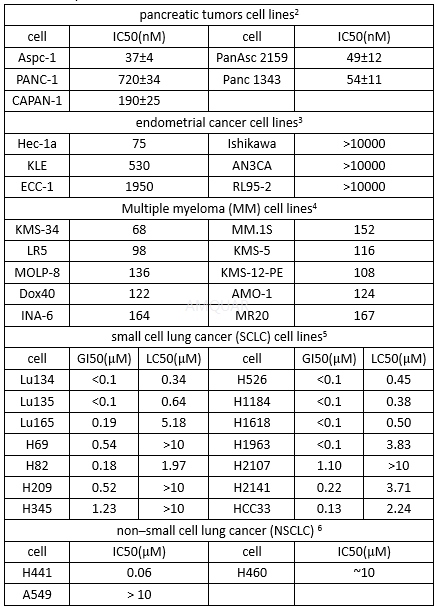
-
体外研究
-
体内研究
5% DMSO溶于5% 葡萄糖
-
激酶实验
-
细胞实验
Cellculture and treatment[7]
HPMECs from healthy subjects were grown inEGM2 medium and passaged using the Detach subculture kit following themanufacturer’s instructions. Cells were cultured until 70% confluent at 37oCand 5% CO2. Twenty-four hours prior to experiments, media waschanged to EGM2 containing 0.1% foetal calf serum (FCS) before being returnedto media containing 5% FCS in the presence or absence of the BET mimic JQ1+ orits inactive enantiomer JQ1−. Cells were used at passages 4–8 and allexperiments repeated at least four times.
Cellmigration
HPMECs were added to the upper chamber of a24-well insert (8 mm pore) in the presence of JQ1 (1μmol/L) either addedimmediately or preincubated for 90 min. Medium (600μL) containing 0% (negativecontrol) or 5% FCS was added to the lower chamber. After 4 h, cells in theupper chambers were removed with cotton buds. If cells were left for >4 h, theyhad moved entirely through the membrane and into the lower chamber. Cells onthe lower chamber membranes were fixed with 3.7% formaldehyde for 5 min,membrane was then cut and mounted between a slide and a cover slip in ProLongantifade mounting solution containing DAPI. Images were taken using a ZeissFluorescence microscope.
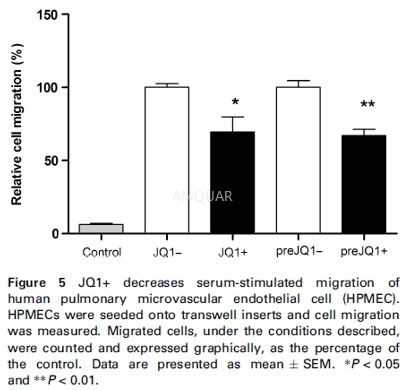
-
动物实验
Animalexperiments[8]
Four-to six-week-old female BALB/c nu/numice were housed under pathogen-free condition. Tumor cells were prepared bysuspending 5 x 106H460 cells in 80 mL of serum-free media, and inoculatedon right rear flanks. Palpable tumor growth appeared within 3-5 days of inoculation,and treatment was initiated when tumors in each group achieved an averagevolume of approximately 40-60 mm3. Tumor-bearing mice wererandomized into four groups (4 mice/group), and treatment groups consisted ofcontrol, JQ1 alone, radiation alone, and thecombination of JQ1 and radiation. JQ1 was administered in a single dose of 50mg/kg/day per mouse for 5 days duration, and mice in the control and radiationalone groups were injected with vehicle. Tumors in the right hind leg of micewere exposed to 10 Gy X-rays beginning 4 h after drug treatment at the firstday. Each animal was tracked individually for tumor growth by external calipermeasurements of subcutaneous protruding tumor and an approximate tumor volumewas calculated using the formula: length x width2x0.5. Animals werealso weighed 3 times a week for the duration of the study. In accordance withinstitutional guidelines on animal care, experimental endpoints were determinedby one of the following: (1) completion of twenty-one day research course, or(2) attainment of tumor burden exceeding 2 cm in any dimension, or (3) furthercomplications affecting animal welfare. Upon reaching experimental endpoints,mice were humanely euthanized, and tumors were excised and dissected forcharacterization and mechanistic studies.
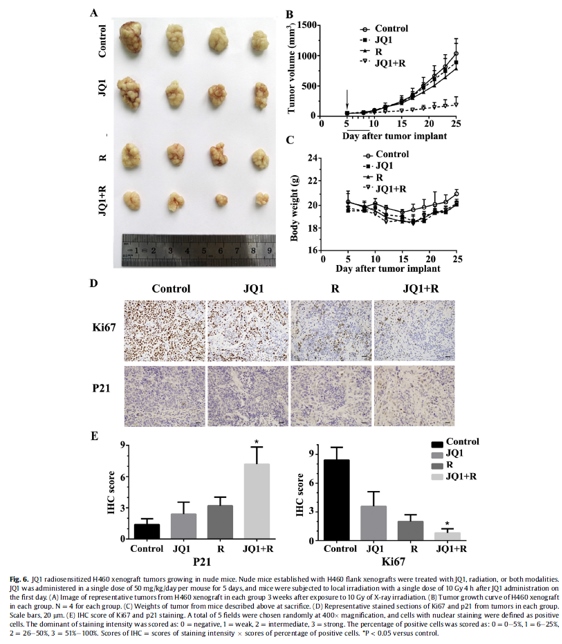
-
不同实验动物依据体表面积的等效剂量转换表(数据来源于FDA指南)
|  动物 A (mg/kg) = 动物 B (mg/kg)×动物 B的Km系数/动物 A的Km系数 |
|
例如,已知某工具药用于小鼠的剂量为88 mg/kg , 则用于大鼠的剂量换算方法:将88 mg/kg 乘以小鼠的Km系数(3),再除以大鼠的Km系数(6),得到该药物用于大鼠的等效剂量44 mg/kg。
-
参考文献
[1] Filippakopoulos P, Qi J, Picaud S, et al. Selective inhibition of BET bromodomains. Nature. 2010;468(7327):1067-1073.
[2] Leal AS, Williams CR, Royce DB, Pioli PA, Sporn MB, Liby KT. Bromodomain inhibitors, JQ1 and I-BET 762, as potential therapies for pancreatic cancer. Cancer Lett. 2017;394:76-87.
[3] Qiu H LJ, Clark LH, Jackson AL, Zhang L, Guo H, Kilgore JE, Gehrig PA, Zhou C, Bae-Jump VL. JQ1 suppresses tumor growth via PTEN/PI3K/AKT pathway in endometrial cancer. Oncotarget. 2016;7(41):66809-66821.
[more]
分子式
C23H25ClN4O2S |
分子量
456.99 |
CAS号
1268524-70-4 |
储存方式
﹣20 ℃冷藏长期储存。冰袋运输 |
溶剂(常温)
|
DMSO
100 mg/mL |
Water
<1 mg/mL |
Ethanol
100 mg/mL |
体内溶解度
-
Clinical Trial Information ( data from http://clinicaltrials.gov )
注:以上所有数据均来自公开文献,并不保证对所有实验均有效,数据仅供参考。
-
相关化合物库
-
使用AMQUAR产品发表文献后请联系我们





